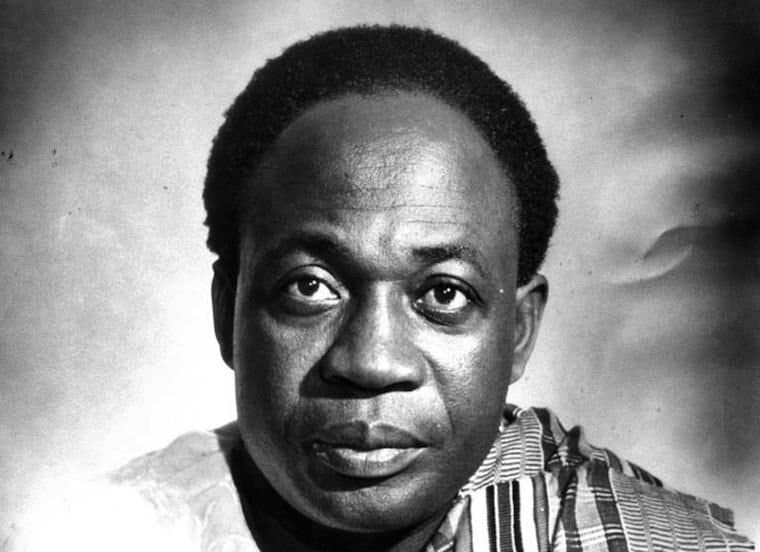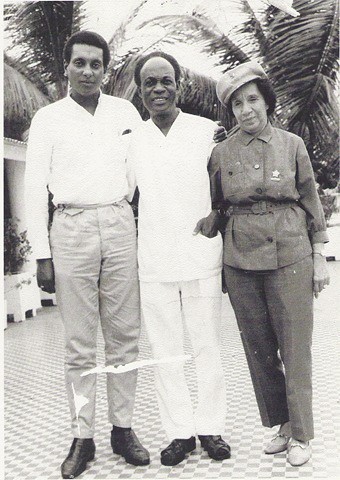
Osagyefo Dr. Kwame Nkrumah arrived in the Gold Coast in August 1947, determined to form his own political party. He honestly stated in his autobiography that he saw the invitation to become the secretary of the United Gold Coast Convention party as an opportunity to implement his own agenda.
Kwame Nkrumah inspired by communist ideals formed what is terms a ‘Vanguard Group’ of the West African national secretariat with a title ‘The Circle’, visualized as a gruo of politicians from various parts of West Africa menbers who were to work secretly in their own countries, ostensibly towards a ‘Union Of Socialist States Of Africa’, similar to the Soviet States Republics. Nkrumah’s contacts were firmly with the political left wing. He was impressed by the teachings of Carl Max and Lenin, Musolin and Hitler believing that their teachings held the secret of banishing imperialism from West Africa. In his own autobiography, he did not mence words when he declared that he had learnt and gained great deal of ideas from those renowned dictators.
Kwame Nkrumah carried in his pocket a Communist Party membership card. He eventually abandoned the idea of legal studies as he became more and more eager to involve himself in the battle for the emancipation of his beloved country – the Gold Coast and the entire continent of Africa.

Perhaps with an ambition to take up the mantle of leadership of Africa. Nkrumah grabbed the opportunity he had been looking for when he received an invitation from the leaders of the newly inaugurated political party – the United Gold Coast Convention (UGCC) to become the secretary.
He honestly informed the UGCC leaders of the financial predicament in which he found himself while in England and pleaded for financial assistance to enable him to pay for his flight home. On receipt of Nkrumah’s cablegram, Dr. Joseph Boakye Danquah who was anxious to have a permanent and competent secretary to man the secretariat of the UGCC persuaded the financial giant of the UGCC Paa Grant to send as much as £100 to Kwame Nkruman. Later that year, Nkrumah packed his bags and left for home – Gold Coast.
Within two months of his assumption of office as general secretary, he and his senior colleagues were imprisoned for a trumped up charge of their part in the organization of the boycott of foreign owned stores and goods led by a chief, Nii Kwabena Bonne – the Osu Alata Mantse.
While Nkrumah and other UGCC members were languishing in prison, the British government appointed a commission led by Mr. Aiken Watson to inquire into and report on the recent disturbances in the Gold Coast and the underlying causes, to make recommendations on any matter arising from the inquiries. This was followed by the appointment of an all African commission under the chairmanship of Mr. Justice Coussey charged wuth the responsiblity of drawing up a new constitution for the Gold Coast.
On their release from prison, the leader, Kwame Nkrumah having familiarized himself with all the structures and key activists of the branches of the UGCC particularly, the Young Wing began to indulge in underhand dealings prejudicial to the solidarity and unity of the mother party – the UGCC. The leadership of the UGCC had no alternative than to relieve him of his post as the general secretary.
In effect, he virtually converted the committee on the Youth organization (CYO) of the UGCC which was headed by the two main personalities namely, Kojo Botsio and K.A Gbedemah as secretary and chairman respectively to form what was to be known as the Convention Peoples Party (CPP). By then the CYO had grown into a powerful organization capable of challenging and toppling the parent party.
When Nkrumah realized that the Cousset committee proposals were pavinv a way for the take over of yhe administration of the country in nit too distant future, he gree increasingly impatient with the moderate lawyers and traders – the Danquah’s and the Paa Grant’s who still controlled the UGCC. He felt that his colleagues in the UGCC were deliberately dragging behind the pace of of the agitation for self rule and in order to use the support of the masses made an unfounded allegation to bribery and corruption against the leaders of the UGCC. Nkrumah proved to be very dishonest because he knee that the British government did not have to bribe anybody to refuse granting self rule to any Colony.
The approach to attain self rule was the cause of the conflict between Kwame Nkrumah and the leaders of the United Gold Coast Convention party. While J.B Danquah and his colleagues of the UGCC believed in step by step approach to free the country from the colonial rule, Kwame Nkrumah wanted self governance without delay. He declared ‘we prefer self government with danger to servitude in tranquillity’. Nkrumah won the masses by the deceptive slogan ‘Self Government Now’ and yet it took him almost 8 months to get independence for the people.

When the Coussey Commission weighty proposals were made public, Nkrumah convened a Ghana Peoples Representative Assembly at a few days notice and the Assembly withvno impudence rejected the Coussey. Report and demanded immediate independence. Although the Assembly had no constitutional significance, it had kne advantage over the Coussey Commission. When he perfectly expressed the impatient nationalism of a great many citizens of the country. Nkrumah encouraged by the reaction of the masses began to preach his nee doctrine of ‘Positive Action’, the Trade Union Congress declared her support for the action taken by Kwame Nkrumah and called for a strike. Kwame Nkrumah saw this as an opportunity to call for a national strike.
The ‘Positive Action’ with it’s attendant strike action dislocated national life fron January 6, 1959. In the course of the disturbances which followed the strike, two policemen lost their lives. Nkrumah and some leaders of the Convention Peoples Party were arrested, tried and sentenced to various terms of imprisonment on charges of inciting workers to go on illegal strike with sedition.
Under the existing law, a terms of imprisonment nit exceeding one year did not disqualify Kwame Nkrumah from being on the electoral roll and from standing for election. Nkrumah took advantage of this law and filed his papers ti stand fir election which was held in February 1951. Nkrumah won his seat while his CPP won all five directly elected seats and 29 of the 33 seats conducted through the electoral colleges. Sir Charles Arden Clarke had no choice but to concede victory to Kwame Nkrumah who was nearing the end of his first one year sentence in James Fort prison.
Kwame Nkrumah was the next day ushered into the presence of the Queen’s Representative to be entrusted with the responsibility of forming a government.
